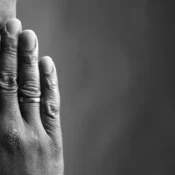How To Tell Children About the Death of a Loved One
“Daddy died” were the words I uttered to my eight-year-old, three-year-old, and 11-month-old.
I watched their puzzled faces process those words and viewed an innocent jovial demeanour turn to wails of despair. I will never forget the moment. It is forever etched in my mind.
“Daddy died”, let me unpack that. My husband of 10 years was involved in a fatal car accident. While I was asleep, he was taking his final breaths. Oh, the fragility of this life.
On the 31st of August 2018, this happened. Although time has passed, reliving those moments pull and tug so tightly on my heartstrings. Sometimes, I find myself in disbelief that this actually happened to me that Gbenga died. It is such a hard pill to swallow.
But one of the most complex parts is the grief I carry for my children.
Culturally, we tend to say that children don’t really know what is going on and bypass their grief journey as we send them off to play. However, this is far from the truth. I’ll take you back to when I was bereaved as a child.
I was six or so when my best companion and cousin died in a poolside accident while on vacation. I remember my aunt, who was about 8 or 9 years older than me breaking the news to me in the most gentle way.
She said, “Bimbo, you know I love you very much,” and I nodded, and she proceeded to say, “I have to tell you something….Tunde died. Do you know what that means?”. I nodded without words trying to process.
I was confused and had questions, but no one could answer them because that was the only conversation I had about Tunde’s death. My parents said nothing about it. Up until the day of the funeral, I still had questions.
My questions were, “what happened?” “How did he die in a pool when he could swim?” What if he was just pretending? “Could we try and wake him up?” “What if he woke up in the coffin while being buried? We need to check again!”.
Of course, we couldn’t check again because as Yoruba’s, the family did not bury the young, so we did not attend the funeral. Therefore, I didn’t get to say my final goodbye.
I cry as I write this, and it’s close to 30 years later.
So let’s debunk the fact that children don’t understand grief or won’t remember. They do, I did.
On the 19th of December 2016, I woke up to the news that my stepbrother Lemar had died at 11 years old. My heart broke, to say the least. I had feelings of disbelief again and anger. (As I was still grieving a close friend, Anike, who had died in her 20’s that October).
Like my parents, I said nothing to my son. I rationalised in my mind that if I told him about Lemar’s death, he might have been scared and heartbroken. I deemed it was too much to tell him. Probably the same rationale my parents had. I wanted to leave him in his blissful innocence and not ‘pollute’ him with the sorrow of this world.
So I hid it, he didn’t come to the funeral, and my sisters and I didn’t talk about Lemar’s death around him. I eventually told him, but a significant time had passed before I was brave enough to have those conversations.
Not even up to 2 years later, August 2018, I now had to face the reality of explaining death to him again, but this time in real-time. Not when I had built up the courage. I had been running away from the exact thing that my parents also avoided when Tunde died. I don’t know how long I could have said Daddy isn’t around for or fails to acknowledge his absence.
This was one of the hardest things I had to do.

As I mentioned earlier, I saw smiles and giddiness turn into wails of sorrow.
In the days, months and years after, they asked so many questions such as “is it because we didn’t pray enough?”, “how did the accident happen?”, “are we sure daddy died and isn’t just sleeping?” “he was so strong. How could he just die?.
Typical questions were “why did he have to die? Could it be someone else?”, “how come my dad died, and everyone else has theirs?. I heard my elder children battle with guilt through questions such as “I should have asked him to stay” “why didn’t I beg daddy not to go?”. It was a struggle for me to see them like this.
Pre Gbengas death bedtime was my favourite time. I would get to connect with the children after a long day of work. We would read, reflect and pray. The bedtime before the car accident, we gathered as usual around my bed and prayed for the family, including ‘daddy’.
So as you can imagine, post-Gbenga’s death, bedtimes were different. They were filled with sobs, protests and anger at how they missed and wanted their daddy back. I would allow them to pray after the sobbing settled, and they mostly prayed for daddy to come back from heaven.
My heart would break each time, and internally I would be enraged at God for allowing this on their behalf. However, on the outside, I would cry with them, hug them tightly and try to encourage them whenever I had the strength to do so.
After some time, bedtimes became less painful, but they are still different and even after three years. The “I miss daddy”, and floods of tears haven’t stopped. But they have reduced.
The expression of grief can also be delayed with children because they don’t have the words. My baby, who is four now but was 11 months at the time of her dad’s death, can finally vocalise her grief.
The other day she was sad in school because she missed ‘daddy’. I spoke to her on the drive home, and she began to wail and cry about it. Unlike usual when she was younger, she would make suggestions like, ‘mummy, how about we get a new daddy?”
Like it was a bright spark idea that we hadn’t already thought of. So this time, I asked her, ‘would it help if you had a new daddy?’. Her response allowed me to understand that she was at the stage where she could understand her grief.
She said, ‘but I will still miss my old daddy’ I agreed with her because, after all, she was right. So I will reiterate, children get grief, it is heartbreaking to hear, and it’s okay to have these discussions with them.
It’s not easy. It’s one of the most complex parts of my grief journey. My children’s grief ached me more than my own. But I still had to allow them to process this pain, even though it was hurting me too.
Doing so has allowed my children to navigate through the death of their loved ones, an ultimate reality of life. These discussions are extremely helpful to their healing journey.

It’s funny how we avoid talking about death like it stops it from happening. Unfortunately, this is not the case. Life and death go hand in hand. To die, one must have lived.
Through my experiences, I can now say I’m a little better at those complex discussions about death. Even when I get crazy questions like “Is there a tunnel in the ground that takes people to heaven”, I can take a deep breath and give them an honest but age-appropriate answer.
Because although children don’t forget and grieve deeply, I can say that they are resilient. And we can facilitate them on this journey of life by equipping them with the right tools.
Sometimes that is difficult conversations that hurt and force a maturing, but on the plus side, they can use those skills as they grow to navigate the hardships of life (when life gives you lemons, make chilled lemonade).
This is how I can support them, and I take solace in knowing they can use the exposure and build resilience for future battles.
My question to you is, how do you support the grieving children in your life?
Facilitating resilience in families is something I’m passionate about, and I do this through the art of storytelling. I recently released my first book, “My sisters are not good at wrestling”, which is a story based on a dream my son had during the depths of grief and highlighted how he processed the loss of his dad magically. It may be helpful for other bereaved children to get a copy for a loved one who it may benefit.
I have had the opportunity to journey with other bereaved people through my In Every Season Podcast. Feel free to listen to the conversations with other bereaved people or those who have walked challenging seasons to see how they have journeyed through and find succour, knowing that there is life after loss.
Getting Support
Balanced Wheel’s Bereavement support groups support anyone who has lost a parent, spouse/partner, child, grandparent, grandchild, sibling/relative, or friend.
Grieving is a highly personal experience. Losing a loved one is a painful experience. Support is available if you have lost someone close to you. Support is available from Balanced Wheel.
You can eventually cope with your loss by getting the proper support. Sharing your experience of grief with others who are experiencing similar things can be more helpful than trying to cope alone.
So, I invite you to join our peer-to-peer bereavement support group.
Are you grieving the loss of someone you loved and would like to join our support group? We will start with two bereavement support groups in September.
Would you please complete this registration form for any of the next two bereavement support groups? I would also like you to forward it to someone who could benefit from a bereavement support group.
I’d love to share your coping with grief story too.
I intend to expand the blog and resources on the website to include stories of other people who have lost a loved one, not limited to losing a spouse. I’d love to hear about how you handled grief. Would you please let me know if you would like to share your story?
I am also open to having anyone anonymised if that’s your preferred option. Complete the contact us form with the text “I would like to share my story.”
To Be Continued Next Wednesday…
I would like to hear from you. Would you please share your thoughts, comments and reflections below? Thank you.
Author
Recent Posts
Grief and Mental Health – Round Post
Collective Grief – Round Post
Getting Over The Death Of A Loved One
Your Story
Matters
info@balancedwheel.co.uk


